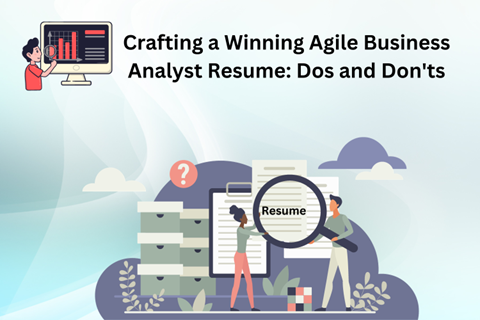In the field of business analysis, having a strong CV is crucial for opening doors like the other industries. Creating an agile business analyst resume requires a strategic approach that highlights your skills and experiences within the framework of agile approaches. We will discuss the crucial dos and don’ts in this blog post to make sure your Agile Business Analyst Resume stands out in the crowd. These pointers can help you succeed on your resume whether you’re a seasoned professional or just starting after finishing an Agile Business Analyst Course.
Table of Contents
Dos: Constructing a Standout Agile Business Analyst Resume
Tailor Your Resume to the Job Description
When it comes to your Agile Business Analyst Resume, customization is crucial. Examine the job description thoroughly, then match your resume to the position’s exact criteria. Emphasize your accomplishments, experiences, and abilities that directly address the demands of the business to show that you are a good fit for the position
Showcase Agile Methodology Expertise
Because agility is so important, you should highlight your experience with agile methods. Emphasize your familiarity with well-known frameworks such as Scrum or Kanban, describing your participation in agile ceremonies facilitation, backlog grooming, and sprint planning. Stress your capacity to adjust to changes and work well with others in an agile setting.
Quantify Achievements with Metrics
On a CV, numbers speak louder than words. When it’s feasible, put a number on your accomplishments to give others a concrete idea of your influence. Mention, for instance, how your agile methodology improved team productivity, increased stakeholder satisfaction quantifiably, or reduced project delivery time by a certain percentage.
Emphasize Collaboration and Communication Skills
Collaboration and efficient communication are key components of agile work settings. Highlight your excellent interpersonal skills by citing examples of how you have encouraged cross-functional team communication, gathered requirements from stakeholders, or led productive workshops. Make it apparent that you can help stakeholders who are not technical understand each other.
Highlight Tools Proficiency
Agile business analysts frequently use a range of tools to improve teamwork and productivity. Mention your familiarity with well-known tools like Jira, Confluence, Trello, or any other tools that are pertinent to your background. This shows that you are not only technically proficient but also conversant with industry-standard collaboration tools.
Prioritize Relevant Certifications
Make sure your CV highlights any relevant credentials you have earned, such as Agile Certified Practitioner (PMI-ACP) or Certified ScrumMaster (CSM), or if you have attended an Agile Business Analyst course. Certifications attest to your dedication to lifelong learning and showcase your proficiency with agile methodologies.
Create a Results-Oriented Professional Summary
Write a professional summary that captures the essence of your experience and your value proposition. Concentrate on outcomes and results, giving a brief overview of your agile achievements. By showcasing your distinct contributions to the agile ecosystem, this area of your resume ought to inspire recruiters to read further.
Don’ts: Common Pitfalls to Avoid in Your Agile Business Analyst Resume
Using Generic Language
Steers clear of overused or general terms that lack specificity. Describe yourself as a “team player” or “detail-oriented,” but include specific examples to support your claims. Employ dynamic language and action verbs to effectively communicate your involvement and influence on projects.
Neglecting to Customize for Each Application
Avoid the urge to tailor your CV to match every applicant. Customizing your resume for every application demonstrates your dedication to the particulars of the position. Spend some time matching your experiences and talents to the position at hand on your CV because recruiters can see a generic one easily.
Overloading with Irrelevant Details
While providing thorough information is vital, keep relevancy in mind as well. Leave out any information that does not directly support your application for the position of agile business analyst. Highlight your experiences and abilities with the agile methodology and the potential company’s requirements.
Ignoring the Power of Keywords
Applicant tracking systems (ATS) are widely used by organizations to expedite the resume screening process. For your CV to effectively go past ATS filters, make sure it contains pertinent keywords from the job description. To maximise the discoverability of your CV, incorporate agile practice-related industry-specific terms and phrases.
Neglecting the Importance of Soft Skills
Technical expertise and soft skills are equally important in the fast-paced world of agile. Don’t minimise the importance of abilities like flexibility, problem-solving, and teamwork. Give examples of how your soft skills were essential to the success of agile projects.
Listing Job Duties Instead of Achievements
One common mistake is to just list duties without highlighting accomplishments. Instead of outlining your duties, concentrate on presenting the results and significance of your labour. Explain the difficulties you encountered, the steps you followed, and the fruitful outcomes you attained using the CAR (Challenge, Action, Result) technique.
Neglecting Formatting and Readability
Recruiters may become discouraged from reading your credentials if your resume is disorganised or ill-formatted. Make sure the layout is orderly and expert, with bullet points, understandable font, and distinct section headings. Make good use of white space to improve readability and make it easier for recruiters to navigate your resume.
Conclusion
Creating an effective Agile Business Analyst resume is a calculated effort that calls for a blend of soft skills, technical expertise, and a deep comprehension of agile processes. Using these dos and don’ts will position you for success in a competitive job market, regardless of your experience level or whether you’ve just finished an Agile Business Analyst course.
Your abilities, experiences, and prospective contributions to agile projects are all reflected in your resume. Through customisation of your resume, highlighting your experience in agile, quantifying your accomplishments, and avoiding common pitfalls, you can create an engaging story that piques the interest of recruiters and puts you in the driver’s seat to land jobs in the fast-paced world of agile business analysis.








